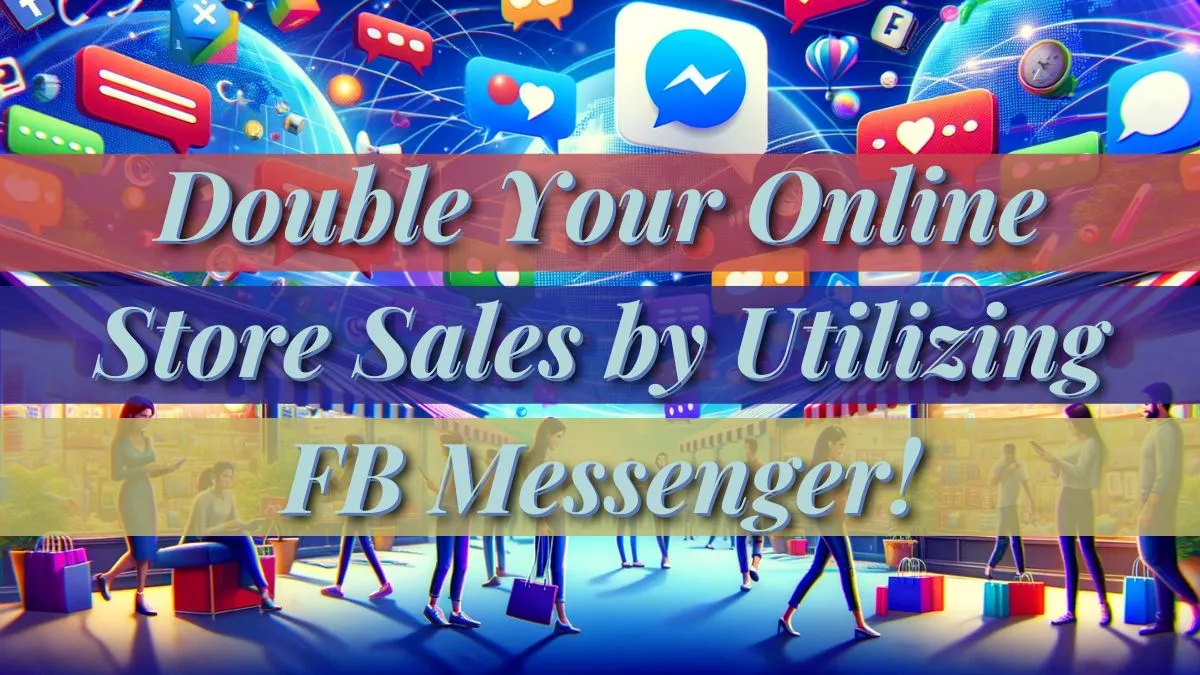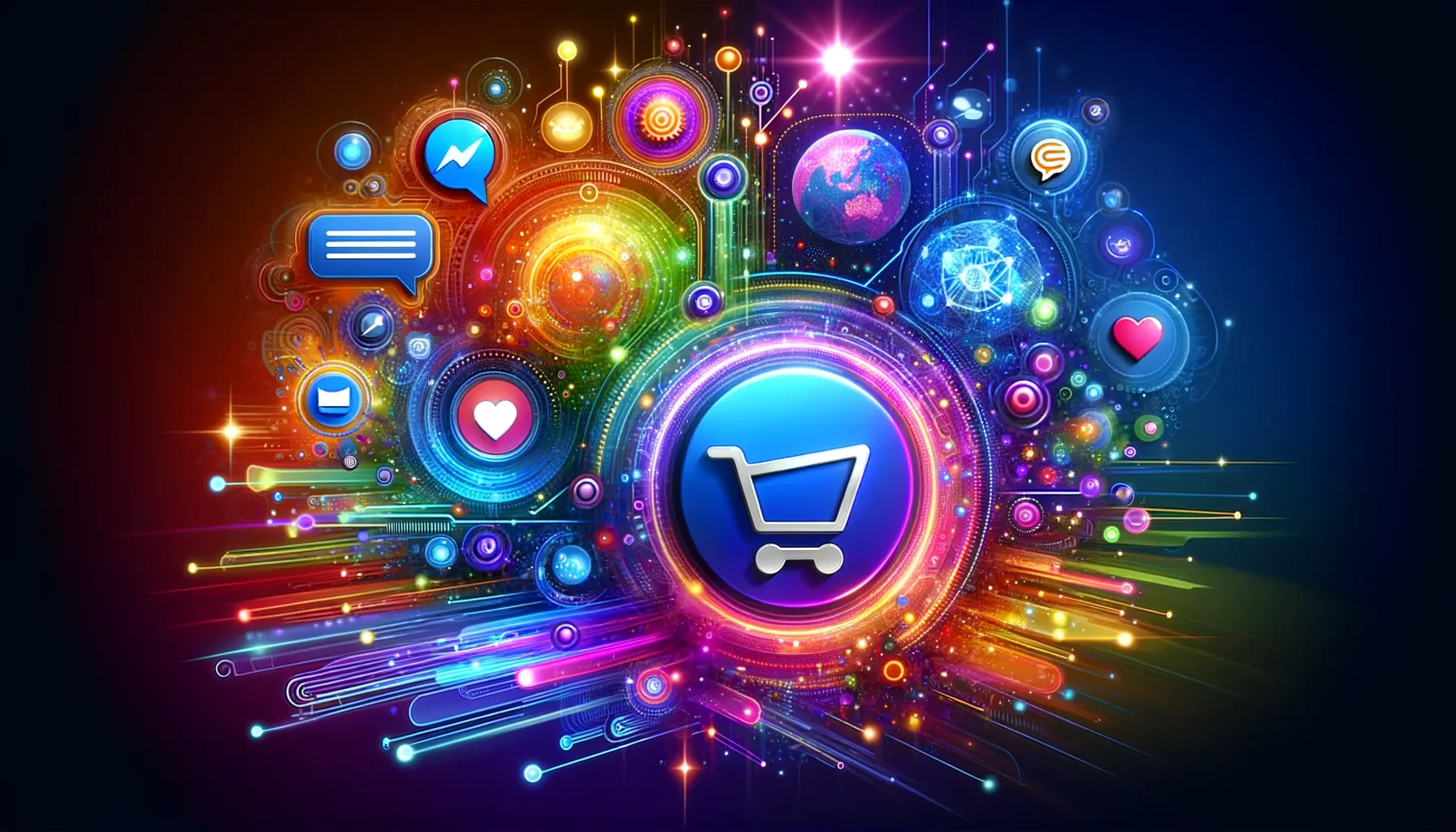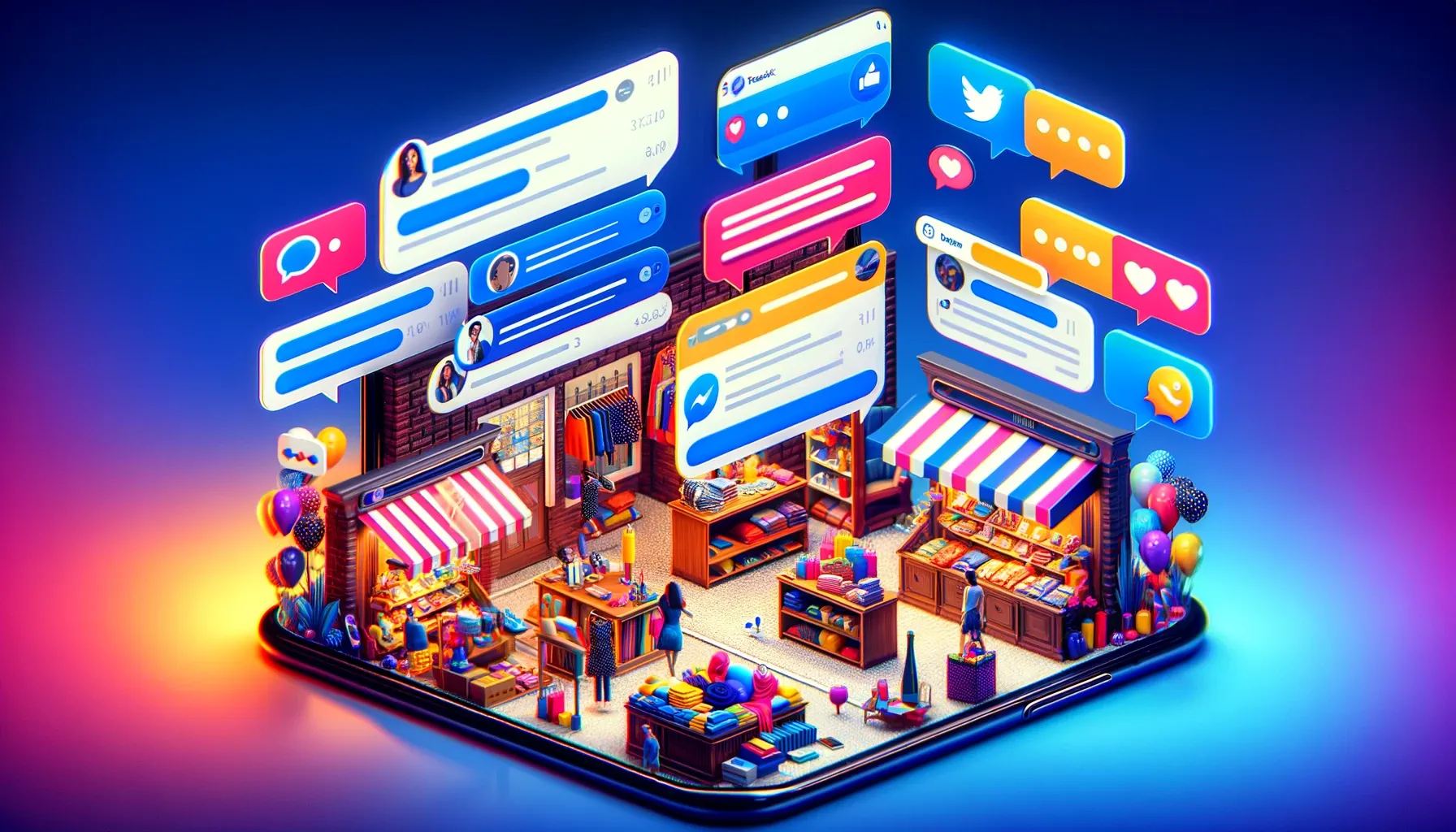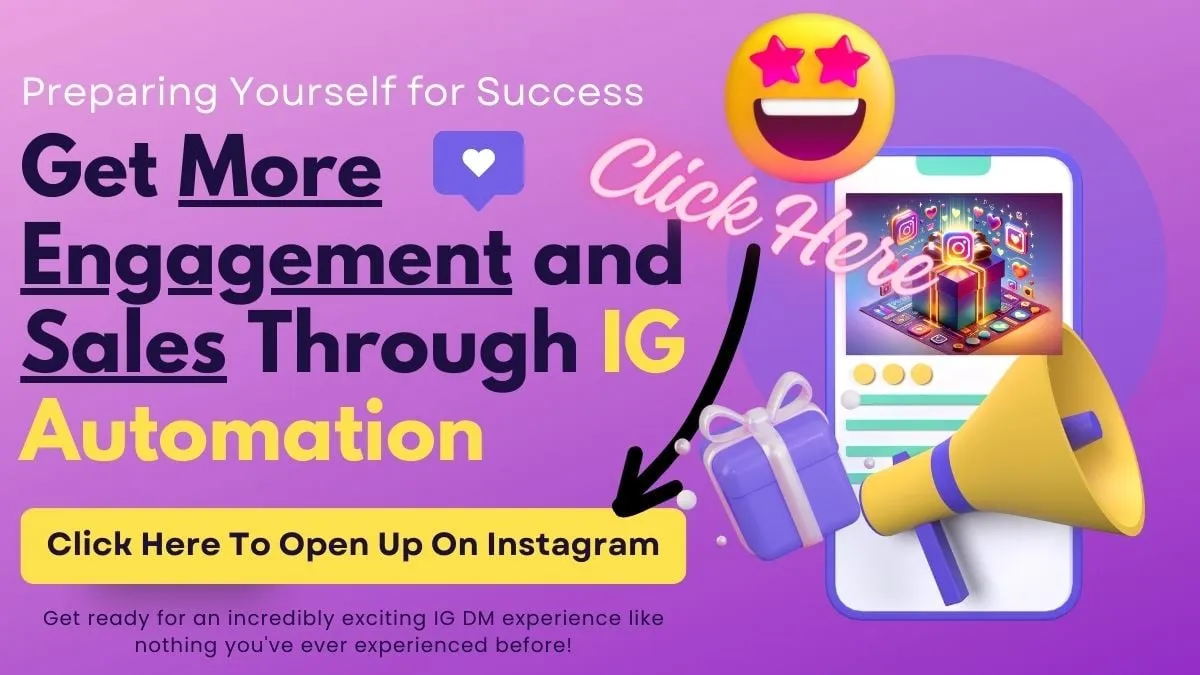E-Commerce in Messenger is Essential for Online Business Growth

Use Chatbots for Facebook Messenger to Increase Sales
In the ever-evolving landscape of online business, the key to success lies not just in keeping pace but in staying a step ahead.
For the astute digital marketer or the visionary entrepreneur, the integration of e-commerce within Messenger platforms such as ***Facebook Messenger*** and Instagram DMs represents more than a fleeting trend; it's a transformative shift, a strategic pivot that could redefine the rules of digital engagement.
Imagine a world where your business is not just reaching out to customers but conversing with them, understanding their needs in real-time, and offering solutions that are not just products but experiences tailored to their individual preferences.
This is not the future; this is the now, enabled by the power of e-commerce in Messenger.
This article is your gateway to understanding why embracing e-commerce in Messenger isn't just beneficial but essential for your online business.
It's about connecting with a generation that is not only tech-savvy but also values immediacy and personalization.
We're talking about a demographic that spends hours on messaging platforms, making them the perfect ground for businesses to sow the seeds of growth and reap the benefits of direct, engaging, and personalized marketing.
Dive in as we unravel the myriad ways in which e-commerce in Messenger can revolutionize your approach, turning every message into a potential sale and every conversation into a customer relationship built to last.
Introduction to E-commerce in Messenger

The landscape of online shopping is evolving rapidly, and at the forefront of this evolution is the integration of e-commerce into messaging platforms.
Messenger platforms have transcended their traditional role of facilitating conversations, morphing into powerful tools for business transactions and customer engagement.
Understanding the Basics of E-commerce on Messenger Platforms
E-commerce in Messenger involves using chat applications as a medium for conducting business transactions. This approach leverages the ubiquity and familiarity of messaging apps to offer a seamless shopping experience.
Customers can browse products, ask questions, make purchases, and even receive customer support, all within a single chat interface.
The Rise of Messenger as a Shopping Platform
The convenience it provides is what has fueled Messenger's growth as a platform for online shopping.
In an era where speed and ease are paramount, Messenger platforms cater to these demands by providing a direct, personalized shopping experience.
This shift is not just about technology; it's about meeting the customers where they are—on their favorite messaging apps.
How E-commerce and Messenger Integration are Changing Online Business
The integration of e-commerce and Messenger is revolutionizing online business by breaking down barriers between customers and brands. It facilitates instant communication, fosters trust, and enhances customer engagement.
This integration is not just changing how businesses sell but also how customers shop, making it a pivotal element in the digital marketing landscape.
The Impact of Chatbot Marketing in E-commerce

As we delve deeper into the realm of e-commerce in Messenger, it's crucial to understand the transformative role of chatbot marketing.
Chatbots, powered by artificial intelligence, are not just tools for automation; they are reshaping the way businesses interact with their customers, offering personalized experiences at scale.
Defining Chatbot Marketing in the E-commerce Context
Chatbot marketing in e-commerce refers to the use of AI-driven chatbots to market products and services, engage with customers, and facilitate transactions.
These bots are capable of understanding and responding to customer queries, providing recommendations, and even handling transactions, all within the chat interface.
This approach is revolutionizing the e-commerce industry by offering a level of interaction and personalization that was previously unattainable.
The Role of AI and Machine Learning in Chatbot Efficiency
The efficiency of chatbots in e-commerce is largely attributed to advancements in AI and machine learning.
These technologies enable chatbots to learn from interactions, improve their responses, and provide more accurate and relevant information to customers.
AI-driven chatbots can analyze customer data, predict preferences, and offer personalized shopping experiences, making them invaluable assets in the e-commerce sector.
Real-world Examples of Successful Chatbot Marketing Strategies
Several businesses have successfully implemented chatbot marketing strategies, witnessing significant improvements in customer engagement and sales.
For instance, a fashion retailer might use a chatbot to offer style advice, suggest products based on customer preferences, and process orders directly through the chat.
These real-world examples demonstrate the potential of chatbots to not only streamline operations but also to drive sales and enhance the overall customer experience.
Enhancing Customer Experience with Messenger

In the current digital era, enhancing the customer experience is paramount to any online business's success.
Messenger platforms play a pivotal role in this, offering unique opportunities to connect with customers more intimately and responsively than ever before.
Personalization and Customer Engagement through Messenger
Personalization is the cornerstone of an enhanced customer experience in e-commerce. Messenger platforms enable businesses to tailor their interactions based on customer preferences and previous interactions.
Advanced chatbot technologies make this personalized approach possible, ensuring that customers feel heard and appreciated, which increases engagement and loyalty.
Streamlining Customer Service and Support
Messenger platforms revolutionize customer service by providing instant, on-demand support. Customers can receive immediate responses to inquiries, resolve issues quickly, and get assistance throughout their shopping journey.
This level of responsiveness not only improves the customer experience but also builds trust and reliability in the brand.
Building Long-term Customer Relationships via Messenger
Messenger platforms offer more than just transactional interactions; they are a tool for building long-term relationships with customers.
Through regular updates, personalized offers, and interactive content, businesses can stay connected with their customers, encouraging repeat business and fostering a community around their brand.
Driving Sales and Conversion Through Messenger

Messenger platforms have emerged as powerful tools for driving sales and conversions in the e-commerce landscape.
By leveraging the immediacy and personalization that these platforms offer, businesses can significantly enhance their sales strategies and conversion rates.
Strategies for Boosting Sales via Messenger Chatbots
One of the key strategies for boosting sales through Messenger is the use of chatbots for proactive customer engagement.
Chatbots can initiate conversations based on user behavior, recommend products, and offer special deals or promotions.
This proactive approach not only increases the chances of conversion but also enhances the shopping experience for customers.
Conversion Optimization Techniques in Messenger E-commerce
Conversion optimization in Messenger e-commerce involves fine-tuning the customer journey to reduce friction and encourage purchases.
This can include optimizing chatbot scripts for clearer communication, simplifying the checkout process within the chat interface, and providing timely and relevant product recommendations.
By focusing on these areas, businesses can significantly improve their conversion rates.
Case Studies: Successful Sales Campaigns on Messenger
Several businesses have successfully leveraged Messenger to drive sales and conversions.
For example, a beauty brand might use a chatbot to offer personalized skincare advice and then seamlessly guide customers to purchase recommended products.
These case studies highlight the effectiveness of Messenger in not only engaging customers but also in driving tangible sales results.
The Role of Analytics in Messenger E-commerce

In the realm of e-commerce, especially when integrated with Messenger, analytics play a crucial role in understanding customer behavior, optimizing marketing strategies, and driving business decisions.
The data derived from Messenger interactions offers invaluable insights that can significantly enhance the effectiveness of e-commerce operations.
Tracking and Analyzing Customer Data with Messenger Tools
Messenger platforms are equipped with tools that allow businesses to track and analyze customer interactions. This data includes customer preferences, purchase history, and engagement patterns.
By analyzing this data, businesses can gain a deeper understanding of their customers, tailor their marketing strategies accordingly, and create more personalized shopping experiences.
Leveraging Analytics for Targeted Marketing Campaigns
Analytics derived from Messenger interactions can be used to create highly targeted marketing campaigns.
By understanding customer preferences and behaviors, businesses can craft messages and offers that are more likely to resonate with their audience.
This targeted approach not only improves the effectiveness of marketing campaigns but also enhances the overall customer experience.
Understanding Customer Behavior through Messenger Interactions
Messenger analytics provide a unique window into customer behavior.
By examining how customers interact with chatbots, the types of questions they ask, and their responses to various prompts, businesses can gain insights into customer needs and preferences.
This understanding is key to refining product offerings, improving customer service, and ultimately driving sales.
Overcoming Challenges in Messenger E-commerce

While Messenger e-commerce presents numerous opportunities, it also comes with its own set of challenges. Addressing these challenges is crucial for businesses to fully capitalize on the potential of Messenger as an e-commerce platform.
Navigating Privacy and Security Concerns
One of the primary challenges in Messenger e-commerce is ensuring privacy and security for both businesses and customers. With sensitive data being exchanged, it's imperative to implement robust security measures.
This includes data encryption, secure payment gateways, and compliance with data protection regulations. Addressing these concerns not only protects the business and its customers but also builds trust, which is essential for long-term success.
Addressing Technical Limitations and Integration Issues
Technical limitations and integration issues can hinder the effectiveness of Messenger e-commerce.
These might include limitations in chatbot functionalities, integration challenges with existing e-commerce platforms, or issues handling high volumes of interactions.
Overcoming these challenges requires a strategic approach, including choosing the right technology partners, continuously updating systems, and ensuring scalability to handle growth.
Strategies for Effective Problem-solving in Messenger E-commerce
Effective problem-solving in Messenger e-commerce involves a proactive approach to identifying potential issues and addressing them promptly.
This includes regular monitoring of chatbot interactions, gathering customer feedback, and staying updated with the latest technological advancements.
By adopting a solution-oriented mindset, businesses can turn challenges into opportunities for improvement and innovation.
Future Trends in Messenger E-commerce

As we look to the future, it is evident that Messenger e-commerce will develop further as a result of technological advancements and shifting consumer behaviors.
Staying ahead of these trends is crucial for businesses to remain competitive and capitalize on new opportunities.
Predictions for the Evolution of Chatbot Technologies
The evolution of chatbot technologies is expected to be a major trend in the future of Messenger e-commerce.
Advancements in AI and machine learning will lead to more sophisticated and intuitive chatbots capable of handling complex interactions and offering even more personalized experiences.
These developments will not only enhance customer engagement but also open up new possibilities for automated sales and marketing strategies.
Emerging Trends in AI and Machine Learning for E-commerce
AI and machine learning are set to play an even bigger role in e-commerce. We can expect to see these technologies being used for advanced data analysis, predictive modeling, and personalized content creation.
This will enable businesses to gain deeper insights into customer behavior, anticipate market trends, and tailor their offerings to meet the evolving needs of their customers.
Preparing for Future Innovations in Messenger E-commerce
To prepare for future innovations in Messenger e-commerce, businesses need to be agile and adaptable.
This involves staying informed about the latest technological advancements, being open to experimenting with new tools and strategies, and continuously refining their approach based on customer feedback and market trends.
By doing so, businesses can position themselves to take full advantage of the opportunities presented by the evolving landscape of Messenger e-commerce.
Implementing Messenger E-commerce in Your Business

For businesses eager to tap into the potential of Messenger e-commerce, understanding the implementation process is key.
This involves strategic planning, choosing the right tools, and ensuring a seamless integration with existing business operations.
Step-by-Step Guide to Integrating Messenger in E-commerce
Implementing Messenger in e-commerce starts with a clear strategy. This includes defining your goals, understanding your target audience, and determining how Messenger can best meet their needs.
The next steps involve selecting the right chatbot platform, integrating it with your e-commerce system, and customizing the chatbot to align with your brand voice and objectives.
Testing and refining the bot based on customer feedback and interaction data is also crucial for its ongoing success.
Best Practices for Launching a Messenger E-commerce Platform
Launching a Messenger e-commerce platform successfully requires adherence to best practices.
This includes ensuring a user-friendly design, maintaining a consistent brand voice, providing clear and concise information, and offering prompt and helpful customer support.
Additionally, it's important to regularly update the platform with new features and content to keep the user experience fresh and engaging.
Measuring Success and ROI in Messenger E-commerce
Measuring the success and ROI of your Messenger e-commerce initiative is essential. Key metrics to track include engagement rates, conversion rates, customer satisfaction scores, and sales generated through the platform.
Analyzing these metrics will provide insights into the effectiveness of your Messenger e-commerce strategy and help identify areas for improvement.
Conclusion: Embracing the Future of E-commerce with Messenger
As we conclude our exploration of e-commerce in Messenger, it's clear that this integration is more than just a passing trend; it's a pivotal shift in the way businesses interact with customers and conduct online transactions.
Messenger e-commerce represents a fusion of convenience, personalization, and technological innovation, offering a unique platform for businesses to connect with their audience and drive growth.
The journey through the various facets of Messenger e-commerce, from enhancing the customer experience to leveraging analytics, overcoming challenges, preparing for future trends, and implementing effective strategies, underscores its significance in the modern digital landscape.
For businesses, particularly those targeting a tech-savvy and dynamic audience, the adoption of Messenger e-commerce is not just an option but a necessity for staying competitive and relevant.
In summary, Messenger e-commerce offers a multitude of benefits, including improved customer engagement, increased sales, and enhanced data insights.
By embracing this platform, businesses can create more meaningful interactions, offer personalized experiences, and build lasting relationships with their customers.
As the digital world continues to evolve, Messenger e-commerce stands out as a key component for any forward-thinking business strategy.




